
Relaciones
Scope & Guideline
Advancing Knowledge, Enriching Perspectives.
Introduction
Aims and Scopes
- Archaeological Studies and Methodologies:
The journal emphasizes rigorous archaeological research, utilizing both traditional excavation techniques and advanced technologies such as LiDAR and spatial analysis to uncover historical narratives. - Cultural Interactions and Social Dynamics:
A core focus is on the interactions between different cultural groups, including indigenous communities and colonial influences, as well as the social networks that shaped historical developments. - Environmental Contexts and Human Adaptation:
Research often explores how ancient populations adapted to their environments, including studies on agricultural practices, resource management, and the impact of climate change on human settlement. - Bioarchaeology and Mortuary Practices:
The journal includes bioarchaeological studies that investigate human remains and burial practices, providing insights into health, diet, and cultural beliefs of past societies. - Material Culture and Technological Innovations:
Papers frequently analyze artifacts, such as pottery and lithic tools, to understand technological advancements and their implications for social structure and daily life.
Trending and Emerging
- Indigenous Knowledge and Community Engagement:
Recent publications highlight the importance of incorporating indigenous perspectives and knowledge systems into archaeological research, fostering collaboration with local communities. - Interdisciplinary Approaches:
There is a marked trend towards interdisciplinary studies that combine archaeology with environmental science, anthropology, and history, enriching the understanding of cultural practices. - Technological Integration in Archaeological Research:
The journal has embraced new technologies, such as remote sensing and GIS, to enhance archaeological investigations, allowing for broader spatial and temporal analyses. - Focus on Climate Change and Environmental Impact:
Emerging research increasingly addresses the impacts of climate change on ancient societies, exploring resilience and adaptation strategies that are relevant to contemporary discussions. - Bioarchaeological Insights into Health and Diet:
A growing body of work is focusing on bioarchaeology to uncover dietary practices, health conditions, and social structures, providing a deeper understanding of past populations.
Declining or Waning
- Colonial Historical Studies:
There seems to be a reduced focus on colonial-era studies, possibly due to a growing interest in pre-Hispanic cultures and indigenous perspectives, leading to less exploration of colonial impacts. - Broad Generalizations in Archaeological Theory:
The journal has moved away from broad theoretical frameworks that do not engage with specific archaeological contexts, favoring more nuanced, case-specific analyses instead. - Traditional Artifact Typology:
There is a noticeable decline in papers that solely rely on traditional artifact typologies without integrating modern analytical techniques or interdisciplinary approaches.
Similar Journals
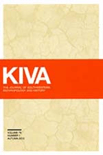
Kiva-Journal of Southwestern Anthropology and History
Diving Deep into Southwestern NarrativesKiva - Journal of Southwestern Anthropology and History is a distinguished academic journal published by Routledge Journals, Taylor & Francis Ltd, that serves as a vital resource for scholars in the fields of anthropology, archaeology, and history. With an ISSN of 0023-1940 and an E-ISSN of 2051-6177, this journal has established itself as a significant avenue for scholarly communication since its inception in 1964. It consistently ranks in the top quartiles, including Q1 in Archaeology and Q2 in Anthropology, reflecting its high impact and rigorous peer-review process. Covering a wide array of topics pertinent to the Southwestern United States, Kiva invites original research articles, reviews, and methodological papers that advance understanding of the region's rich cultural heritage and historical narratives. While currently not open access, its commitment to disseminating quality research makes it an essential reading for researchers, professionals, and students aiming to explore the multifaceted dimensions of southwestern studies.
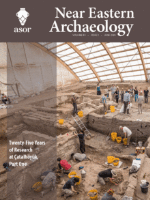
NEAR EASTERN ARCHAEOLOGY
Pioneering Insights into Archaeology and HistoryNEAR EASTERN ARCHAEOLOGY, published by University of Chicago Press, is a premier journal dedicated to the field of archaeology, particularly focusing on the rich cultural heritage and archaeological findings of the Near East. With an ISSN of 1094-2076 and an E-ISSN of 2325-5404, this esteemed publication provides a vital platform for scholars and practitioners to share their research, insights, and discoveries. The journal holds an impressive ranking in the Q1 quartile for both Archaeology and History in 2023, reflecting its significant impact within these fields and a robust history of scholarly contribution. The journal has been pivotal in shaping discussions around archaeological methodology, theory, and contemporary issues from 2002 to 2024, as it continues to reach a wide audience through various access options. With Scopus rankings placing it in the top percentiles for both History and Archaeology, NEAR EASTERN ARCHAEOLOGY represents an essential resource for researchers, professionals, and students alike, fostering the exploration and understanding of the region's archaeological narrative.
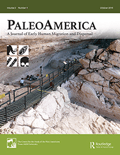
PaleoAmerica
Decoding the Stories of Ancient American CulturesPaleoAmerica, published by Routledge Journals, Taylor & Francis Ltd, is a leading academic journal dedicated to advancing the study of ancient peoples of the Americas. With a strong presence in the fields of archaeology, ecology, and paleontology, this journal holds Q1 rankings in its respective categories for 2023, reflecting its exceptional impact and relevance in academia. Covering a broad spectrum of topics related to human and ecological evolution from 2015 to 2024, PaleoAmerica serves as a vital resource for researchers, professionals, and students eager to explore pivotal findings and theories related to the prehistoric populations of North and South America. While the journal operates under a subscription model, its comprehensive scope and high-quality peer-reviewed articles make it indispensable for those engaging with the complex narratives of ancient American life.
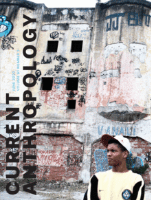
CURRENT ANTHROPOLOGY
Innovating Insights into Human SocietiesCURRENT ANTHROPOLOGY, published by the esteemed University of Chicago Press, stands as a premier journal in the fields of anthropology and archaeology, with an impressive impact factor that signifies its relevance and authority in the academic community. With both print (ISSN: 0011-3204) and digital formats (E-ISSN: 1537-5382), this journal provides a platform for groundbreaking research, theoretical advancements, and critical discussions that shape our understanding of human cultures and societies. Since its inception in 1962, CURRENT ANTHROPOLOGY has continually pushed the boundaries of knowledge and inquiry, earning a prestigious Q1 ranking in 2023 across multiple categories, including Social Sciences and Archaeology. Researchers and professionals alike rely on this journal not only for its rigorous peer-reviewed articles but also for its commitment to interdisciplinary approaches and innovative methodologies. While not currently offering open access, CURRENT ANTHROPOLOGY remains an essential resource for students and scholars eager to stay abreast of the latest developments in anthropological research.
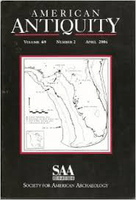
AMERICAN ANTIQUITY
Preserving Knowledge, Inspiring Discovery.AMERICAN ANTIQUITY, published by Cambridge University Press, stands as a premier journal in the fields of archaeology, arts and humanities, history, and museology. With an enduring legacy since its inception in 1935, this journal has consistently ranked in the Q1 category across several disciplines, reflecting its significant impact and authority in shaping contemporary scholarly discourse. It boasts impressive Scopus rankings, placing it in the 99th percentile for archaeology and history, which underscores its critical role in advancing research and understanding of American archaeology and related fields. Although it does not currently offer open-access options, the journal remains a vital resource for researchers, professionals, and students seeking high-quality, peer-reviewed content. As it converges toward 2024, AMERICAN ANTIQUITY continues to foster innovative scholarship and preserve knowledge, making it an essential reading for anyone invested in the exploration of cultural heritage and historical narratives.

Time & Mind-The Journal of Archaeology Consciousness and Culture
Decoding Cultural Practices Through TimeTime & Mind - The Journal of Archaeology Consciousness and Culture, published by Routledge Journals, Taylor & Francis Ltd, stands at the intersection of archaeology and consciousness studies, revealing the intricate relationship between cultural practices and human cognition. With a robust ISSN of 1751-696X and an E-ISSN of 1751-6978, this esteemed journal plays a vital role in fostering interdisciplinary dialogue among scholars in the realms of anthropology and archaeology. Notably recognized for its rigorous academic standards, it achieved a commendable Q2 category ranking across various fields in 2023, including Anthropology and Archeology, alongside impressive Scopus rankings. As it continues to publish cutting-edge research from 2008 to 2024, this journal remains dedicated to exploring the nuances of human experience through the lens of archaeological evidence, making it an indispensable resource for researchers, professionals, and students alike seeking to deepen their understanding of the cultural dimensions of consciousness.

California Archaeology
Advancing Knowledge Through California's Archaeological LensCalifornia Archaeology is a premier academic journal dedicated to the multifaceted study of archaeology within the context of California's rich historical and cultural landscape. Published by Routledge Journals, Taylor & Francis Ltd, this journal conveys cutting-edge research from 2009 to 2024 and is recognized for its impact in the field, with a commendable Q2 ranking in both archaeology and arts and humanities as of 2023. Scholars and practitioners are encouraged to disseminate their findings and insights through this journal, contributing to a deeper understanding of archaeological practices and interpretations in California. With access options designed to enhance the visibility of research, California Archaeology serves as an essential resource for professionals, students, and researchers devoted to advancing knowledge in archaeology, making it a cornerstone of academic discourse in the discipline.

ARCHAEOLOGY IN OCEANIA
Exploring the Depths of Pacific HeritageARCHAEOLOGY IN OCEANIA, published by Wiley, is a leading journal that delves into the rich and diverse archaeological landscape of the Pacific region. With a commitment to advancing knowledge in anthropology and archaeology, this esteemed publication has been pivotal in shaping scholarly discussions since its inception in 1966. Spanning generations of research, it has seen converged years of publication from 1966 to 1980 and from 2002 to 2024. With an impressive Scopus ranking placing it in the top quartiles across multiple categories - including Q2 in Anthropology and Q1 in Archeology (arts and humanities) - the journal distinguishes itself as a must-read for researchers, professionals, and students alike. Although it operates on a subscription model, its rigorous peer-reviewed articles and comprehensive studies contribute significantly to understanding the past of Oceania, making it an essential resource for those invested in this vibrant field of study.
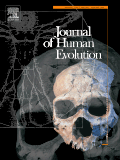
JOURNAL OF HUMAN EVOLUTION
Pioneering Research in Anthropology and EvolutionThe JOURNAL OF HUMAN EVOLUTION, published by ACADEMIC PRESS LTD - ELSEVIER SCIENCE LTD, is a premier academic journal focusing on the evolutionary biology of humans and their ancestors. With an esteemed Q1 ranking in the fields of Anthropology and Ecology, Evolution, Behavior and Systematics, this journal is a vital resource for researchers, professionals, and students dedicated to understanding human origins and evolutionary processes. The journal has been steadfastly contributing to the field since 1972, converging knowledge and insights through meticulously peer-reviewed articles. Additionally, it holds an impressive Scopus rank of #12/502 in Anthropology and #105/721 in Ecology, underlining its significant impact and prestige within the academic community. While the journal is not open access, its content remains accessible to those within institutional affiliations, fostering an environment rich in scholarly exchange and innovation. By disseminating cutting-edge research and comprehensive reviews, the JOURNAL OF HUMAN EVOLUTION continues to illuminate the complex narrative of human evolution and is essential reading for anyone engaged in this dynamic field.

Magallania
Cultivating Insightful Analyses for Social ProgressMagallania is a pioneering open-access journal published by UNIV MAGALLANES, dedicated to advancing scholarly discourse in the field of Social Sciences. Since its inception in 2005, the journal has provided a platform for original research, critical reviews, and insightful analyses that address diverse issues affecting society in both local and global contexts. Based in Punta Arenas, Chile, Magallania has established itself as an essential resource for researchers, professionals, and students alike, particularly in its current position within the Q2 category of Social Sciences (miscellaneous) as of 2023. With an ongoing commitment to quality and accessibility, the journal aims to foster interdisciplinary dialogue and promote knowledge exchange, all while contributing to a deeper understanding of social dynamics and challenges. Magallania is indexed in Scopus, ranking competitively in the field; it reflects the dynamic scholarly environment that characterizes the vibrant region of Magallanes and beyond.